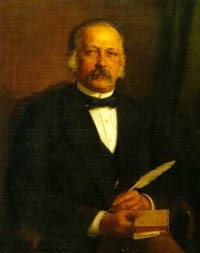GE312 The Rise of Capitalist Modernity.
| Module Code: GE312 |
|---|
| Module Name: The Rise of Capitalist Modernity: Gender, Class, Identity |
|
Module Coordinator: Dr Dan Hall in 2023-24 |
| Time tbc |
| Module Credits: 30 |
Module Description
(Prior to 2021 entitled 'The Writer and Imperial Germany.')
Ranging from the late 19th century to the early 1930s, this module covers a key period in modern German and Austrian literature and culture. Following a loosely chronological line, it examines the evolution of modern German literature from the late 19th century across a wide spectrum of authors, genres and themes in dialogue with major social, cultural and political movements that mark the transformation of Germany and Austria from the 1870s onwards. The late 19th century was not only the period in which German unification was achieved, but also an era of accelerated modernization.
On the one hand, the belated advancement of new technologies and industrial production went hand in hand with the widening demand for new democratic powers and the emergence of the women’s movement. Gender roles, class positions, human sexuality, colonialism and competing notions of identity were the subject of intense enquiry in the social sciences and in the arts. On the other hand, the rapid transformation of society was also experienced as a crisis of identity that fuelled anti-semitism and a völkisch version of German nationalism which finally erupted in World War 1. Literature, the fine arts and later film became key vehicles for expressing ambivalent attitudes to modernity.
This course explores the discourse on modernity by analysing major literary movements in dialogue with broader social and cultural debates. Beginning with Poetic Realism, we then analyse Naturalism and the transition towards Modernism. This final year module is open to all finalists taking German and German-related degree courses, and to suitably qualified external students.
Areas covered include:
Germany and the Industrial Revolution; the Naturalist movement: social themes and dramatic form; social critique: women and the family; the experience of the modern city; sexuality, adolescence, and education in the Wilhelmine period; gender and modernity; the response of German writers to the First World War; attitudes to German colonialism; the city in the Weimar Republic
Authors covered include:
Theodor Fontane, Gerhart Hauptmann, Frank Wedekind, Else Lasker-Schueler, Arthur Schnitzler, Thomas Mann, Franz Kafka, Irmgard Keun.
As this is a final year module, the emphasis is primarily on student-led seminar work, with occasional lectures providing the historical context. Seminars are a combination of small group student-led discussion focused on a particular aspect of the topic, followed by a broader plenary session.
Assessment Method:
3500 word essay (50%) and online exam (50%).

